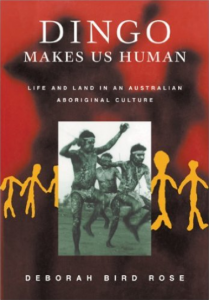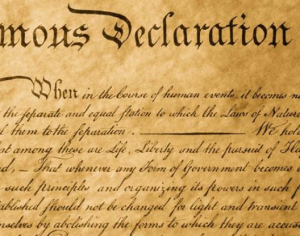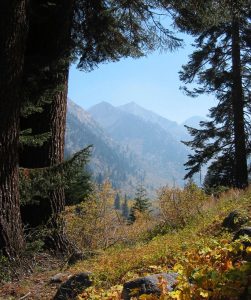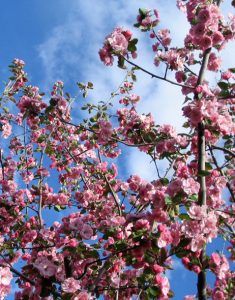 Of the many voices I included in Kissed by a Fox, one has stayed with me longer than just about any other. That voice belongs to Doug Campbell, an Aboriginal man from Australia who worked with the anthropologist Deborah Bird Rose. Campbell said in Rose’s Dingo Makes Us Human,
Of the many voices I included in Kissed by a Fox, one has stayed with me longer than just about any other. That voice belongs to Doug Campbell, an Aboriginal man from Australia who worked with the anthropologist Deborah Bird Rose. Campbell said in Rose’s Dingo Makes Us Human,
You see that hill over there? Blackfellow Law like that hill. It never changes. Whitefellow law goes this way, that way, all the time changing. Blackfellow Law different. It never changes. Blackfellow Law hard—like a stone, like a hill. The Law is in the ground.
Campbell’s words lead me to think about white people’s law, compiled in early modern England and now becoming world law. What would it mean to root this law in the ground—in nature, in the Earth? Here are some starting points.
Radical democracy
Earth law has its foundation in radical democracy. The Earth treats everyone alike. We live, we die. No exceptions. Death is the great equalizer.
 American law had its start in such a democratic vision; the Declaration of Independence calls attention to this “self-evident” democracy of the Earth:
American law had its start in such a democratic vision; the Declaration of Independence calls attention to this “self-evident” democracy of the Earth:
We hold these truths to be self-evident, that all men are created equal, that they are endowed by their Creator with certain unalienable Rights, that among these are Life, Liberty and the pursuit of Happiness.
We come into being, we pass out of being. Every one of us. Any laws that try to limit this radical equality do not align with Earth.
Corporations are not people
A system of law based in Earth does not mistake corporations for people. A corporation is a piece of property, like a building or a painting or a car. Like them, it was created by human beings. An artifact of human making does not hold the inherent rights of natural beings, who live and die through the power of nature itself.
Extending civil rights to a corporation is like giving your house the right to vote. Yes, your house protects you and collects a community of people under its roof. Does that mean it deserves the rights of natural beings? No. Neither do corporations. Any law that gives them such rights will collide with the harder and longer-lasting laws of the living beings of Earth.
Natural beings can’t be owned
A legal system rooted in Earth is not based on owning and trading the natural beings of Earth for personal profit. White people used to think they could  own people of color; this country waged a costly war to change that law. Today, movements are under way to recognize that other natural beings too have rights. The international rights-of-nature movement works to preserve healthy ecocommunities because they have a right to exist—and their health is the foundation of human health. Some groups work to nudge concepts of land ownership toward land stewardship instead. In Earth-based law, seeds can’t be patented; waters can’t be privatized; land “owners” are but temporary caretakers. The only things people can own are things people have created.
own people of color; this country waged a costly war to change that law. Today, movements are under way to recognize that other natural beings too have rights. The international rights-of-nature movement works to preserve healthy ecocommunities because they have a right to exist—and their health is the foundation of human health. Some groups work to nudge concepts of land ownership toward land stewardship instead. In Earth-based law, seeds can’t be patented; waters can’t be privatized; land “owners” are but temporary caretakers. The only things people can own are things people have created.
Diversity is stronger
Ecologists tell us that the health of an ecocommunity rests in (1) how much more new life it grows (biomass) and (2) how resilient it is in the face of change (stability). On both counts, ecologically diverse communities do better. Human laws that protect diversity—of plant life, animal life, or human life—are more aligned with nature than those that don’t.
At the foundational levels of biology and ecology, we are stronger together.
The bottom line is give-and-take
Reciprocity, or give-and-take, characterizes Earth law. Breathing is the most immediate, intimate example of it. We breathe in, we breathe out. Forests too breathe in and out. Trees suck water up through their roots and transpire it through their leaves in daytime, lowering the amount of water in neighboring streams, while at night transpiration slows and stream flows increase. I once heard an earth scientist say at a forestry conference,
Following the stream flow gives us a way of watching the whole watershed breathing in and out.
And as NASA showed in a mesmerizing video, the Earth itself breathes in and out as vegetation grows and diminishes throughout the year:
Modern law does not reward give-and-take. Capitalism, the economic system enshrined in modern law, rewards growth and accumulation, forgetting about the other half of the cycle—breathing out. This fact alone can explain why life on Earth as we know it is in severe peril. Today, ecological economists say that a finite planet cannot sustain infinite growth. Some suggest alternatives to GDP for measuring progress and well-being.
In the law of the Earth, what each one takes in is balanced by what each one gives out. Nature does not reward accumulation. We will be able to address the ill health of Earth only when we are willing to change human laws to match this hard law of Earth: the true bottom line is reciprocity.
Competition finds its balance in cooperation
The modern world’s story of nature took shape at the same time is its system of laws, and both emphasized competition and ignored cooperation in  nature. I told this story in the middle chapters of Kissed by a Fox—how a cutthroat account of human nature fed the rise of capitalism and how this jaundiced view was projected back onto nature.
nature. I told this story in the middle chapters of Kissed by a Fox—how a cutthroat account of human nature fed the rise of capitalism and how this jaundiced view was projected back onto nature.
Scientists today are beginning to right this skewed view. From game theorists to animal scientists, researchers are saying loudly and clearly that cooperation plays a much larger role in evolution than previously thought. Righting our skewed law, which too often rewards competition at the expense of cooperation, is a logical next step.
Always becoming
The Earth is always trying a new thing—billions of new things. Evolution is the process of nature seizing every possible opportunity to try something new. Some innovations last a while, others for eons, others not at all. But the unceasing creativity in nature apparently does not measure success by permanence. It just reaches for something new, again and again and again.
The endless becoming of Earth speaks of freedom—a radical sense of possibility—existing in each moment and in each situation. Out of limited food sources in the Galápagos Islands, and a scarcity of different species of birds, one kind of finch evolved into dozens, each with a beak sized perfectly for its own food source. When Darwin found them in 1835, it revolutionized human understandings of nature. Though people saw species as immutable, Darwin showed that at the core of nature lies change.
To align with Earth, communities and their laws likewise need to welcome creativity and be open to becoming something new.
No two alike
 Take a look at the blossoms outside your window, or the seedheads they leave behind in autumn. No two are exactly alike. Nature loves individual variation—not in the sense of stale repetition on a theme but in the sense of something new and marvelous. Nature abhors uniformity.
Take a look at the blossoms outside your window, or the seedheads they leave behind in autumn. No two are exactly alike. Nature loves individual variation—not in the sense of stale repetition on a theme but in the sense of something new and marvelous. Nature abhors uniformity.
This preference for unique variation suggests a deep respect for individual choice. It is up to each creature, each individual or species, to see for themselves what works. To try their own variation on the theme. To follow the path that presents itself to them.
Human laws, to align with Earth, likewise must respect individual choice.
We are the environment
Law based in Earth would recognize that the wider ecocommunity is our life support system. Today, the international movement to eradicate ecocide calls attention to human beings’ utter dependence on nature. Without water and soil and plants and birds and animals, we die. We are the environment, and the environment is us. In destroying the environment, we destroy us.
Nature bats last
Finally, an Earth-based system of law would recognize that human law is not the final authority. Nature will have the last word. It takes humility to acknowledge, as Doug Campbell and his people do, that there is no arguing with the hard laws of Earth. They were in place long before we arrived. In this Earth family we are the babies, and we have much to learn from our elders.
For more on Earth-based law, see my article “Breathing In, Breathing Out: The Biological Foundation for Sustainable Social and Economic Life” in the Journal of Sustainability Education (March 2015).














